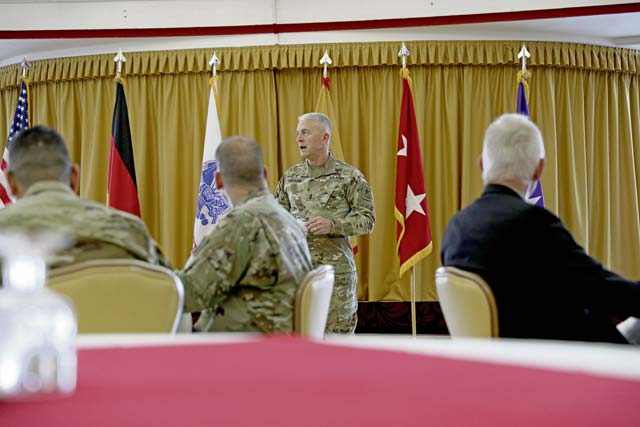
When taking a look at how to improve and sustain Army readiness, one of the main domains that has taken a spotlight recently is spirituality. Maj. Gen. Thomas Solhjem, U.S. Army Chief of Chaplains, visited leaders from the 21st Theater Sustainment Command Oct. 19, to introduce and address the Spiritual Readiness Initiative, which aims to target Soldier spirituality throughout the Army.
With the many beliefs of individuals, including some with no beliefs in existential things, the question becomes figuring out how to address all Army personnel’s spiritual agility.
“Regardless of whether they have a religious belief or not, as leaders we have responsibilities to care for them even if we’re religious or not because that’s your Soldier,” Solhjem said. “Part of knowing them is knowing how they identify, how they see themselves and to respect that.”
The Army is consistently thinking of ways to adapt, respond and overcome challenges that may test the prosperity of Soldiers. As we work together to integrate the spiritual dimension into our Army formations, Solhjem believes that many harmful behaviors will be dialed back.
“As the Army goes, so goes the nation and I believe we set the needle for our country,” Solhjem said.
“For Soldiers that may not be religious this program will focus on the spiritual connection to those around them. Even the most staunch atheist can believe that we are still connected and we have a moral obligation to take care of our neighbors,” Col. Stanton Trotter, the 21st TSC Command Chaplain said. “Spirituality is not just organized religion.”
The three-day Spiritual Readiness Initiative program has taken tools from Dr. Lisa Miller, a professor, researcher and clinical psychologist. “Miller has empirical, scientific analysis that if someone’s spirituality is in a healthy place they’re going to thrive more as a person and 80 percent less likely to be addicted to drugs, suicide, and commit harmful behaviors,” Trotter said. The program aims to get leaders to talk about spirituality with Soldiers because normally leaders just say “Chaplain take care of it” and this program is for leaders at all levels. After leaders participate in the training, they will have tools on how to talk to their soldiers and will have a guided questionnaire to get Soldiers to think about spiritual issues and get them to do a self-assessment.
“As we develop peoples spirituality, it makes them stronger humans and more resilient,” Trotter said.
So far, the program has been implemented 11 times throughout different units and plans to make its way to the 21st TSC some time in February 2022. Solhjem has been traveling to different units to build momentum and to get leaders ready to take action.
“When you’re gone, the knowledge goes with you and if you can’t change the culture in the next five to seven years we lose, so the urgency is to get after it today,” Solhjem said. “We don’t have the luxury of time.”


